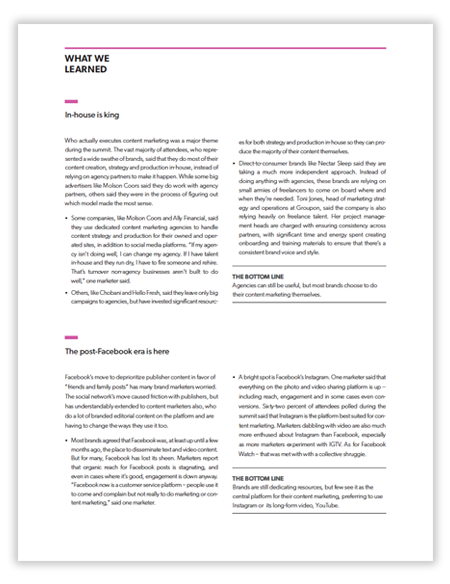Secure your place at the Digiday Media Buying Summit in Nashville, March 2-4
‘Content marketing has an ROI problem’: Insights from the Digiday Content Marketing Summit
Brand marketers gathered in Vail, Colorado last week to discuss how to do content marketing right, whether video is worth the investment, and how best to answer that pesky ROI question. Digiday+ members can download an in-depth Event Briefing below, detailing highlights, key conversations and new tactics and strategies from the three-day summit.
Content marketing is effective, but it isn’t easy. And as companies ask tougher questions about their marketing performance, it remains particularly difficult to link content marketing to hard business metrics like conversions and leads, or really any other kind of metric.
Three key themes emerged over the course of the event:
Content marketing has an ROI problem
Return on investment has always been an issue with content marketing. Many marketers say that the “return” is less about conversions or leads — and rarely is it easy to even link marketing to those — but it’s more about soft metrics like brand lift, brand awareness, or engagement. But at the summit, it was clear that measuring those isn’t easy either.
In-house is king
Who actually executes content marketing was a major theme during the summit. The vast majority of attendees, who represented a wide swathe of brands, said that they do most of their content creation, strategy and production in-house, instead of relying on agency partners to make it happen. While some big advertisers like Molson Coors said they do work with agency partners, others said they were in the process of figuring out which model made the most sense.
The post-Facebook era is here
Facebook’s move to deprioritize publisher content in favor of “friends and family posts” has many brand marketers worried. The social network’s move caused friction with publishers, but has understandably extended to content marketers also, who do a lot of branded editorial content on the platform and are having to change the ways they use it too.
Digiday+ members can access the full Event Briefing below:
More in Marketing

Future of Marketing Briefing: AI’s branding problem is why marketers keep it off the label
The reputational downside is clearer than the branding upside, which makes discretion the safer strategy.

While holdcos build ‘death stars of content,’ indie creative agencies take alternative routes
Indie agencies and the holding company sector were once bound together. The Super Bowl and WPP’s latest remodeling plans show they’re heading in different directions.

How Boll & Branch leverages AI for operational and creative tasks
Boll & Branch first and foremost uses AI to manage workflows across teams.






